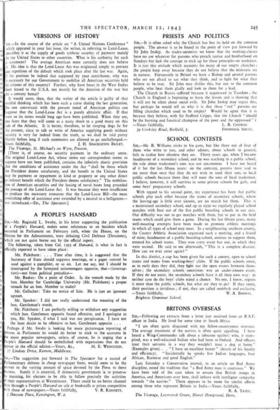VERSIONS OF HISTORY
sis,—In the course of the article on "A United Nations Conference" which appeared in your last issue, the writer, in' referring to Lend-Lease, describes it as the supply of goods without security of payment mainly by the United States to other countries. What is his authority for such a statement? The average American most certainly does not believe a. His idea is that the Lend-Lease Act was originated simply to prevent any repetition of the default which took place after the last war. Again, if the position be indeed that supposed by your contributor, why was it necessary for our Government to mobilise all American securities held by citizens of this country? Further, why have bases in the West Indies been leased to the U.S.A. not merely for the duration of the war but for a century hence?
It would seem, then, that the writer of the article is guilty of that wishful thinking which has been such a curse during the last generation. No one conversant with the present trend of American politics can suppose that the Lend-Lease Act is a purely altruistic affair. If that were so its terms would long ago have been published. When they are, one fears that they will come as a nasty shock to a good many on this side of the Atlantic. It is better, therefore, to let sleeping dogs lie for The present, since to talk or write of America supplying goods without security is very far indeed from the truth, as we shall be told pretty bluntly before long if such statements are allowed to go unchallenged.—
The Vicarage, St. Michael's on Wyre, Preston.
[There is, of course, no security payment in the ordinary sense. The original Lend-Lease Act, whose terms our correspondent -seems to suppose have not been published, contains the infinitely elastic provision that the conditions of assistance under the Act "shall be those which the President deems satisfactory, and the benefit to the United States may be payment or repayment in kind or property or any other direct or indirect benefit which the President deems satisfactory." The mobilisa- tion of American securities and the leasing of naval bases long preceded the passage of the Lend-Lease Act. It was because they were insufficient to produce the necessary resources that the Lend-Lease Bill—the most astonishing offer of assistance ever extended by a neutral to a belligerent— was introduced.—En., The Spectator.]


























 Previous page
Previous page